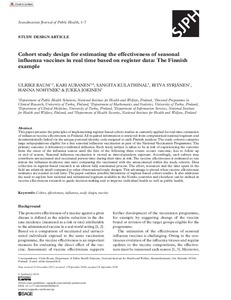Cohort study design for estimating the effectiveness of seasonal influenza vaccines in real time based on register data: The Finnish example
Baum Ulrike; Auranen Kari; Kulathinal Sangita; Syrjänen Ritva; Nohynek Hanna; Jokinen Jukka
Cohort study design for estimating the effectiveness of seasonal influenza vaccines in real time based on register data: The Finnish example
Baum Ulrike
Auranen Kari
Kulathinal Sangita
Syrjänen Ritva
Nohynek Hanna
Jokinen Jukka
Sage
Julkaisun pysyvä osoite on:
https://urn.fi/URN:NBN:fi-fe2021042823748
https://urn.fi/URN:NBN:fi-fe2021042823748
Tiivistelmä
This paper presents the principles of implementing register-based cohort studies as currently applied for real-time estimation of influenza vaccine effectiveness in Finland. All required information is retrieved from computerised national registers and deterministically linked via the unique personal identity code assigned to each Finnish resident. The study cohorts comprise large subpopulations eligible for a free seasonal influenza vaccination as part of the National Vaccination Programme. The primary outcome is laboratory-confirmed influenza. Each study subject is taken to be at risk of experiencing the outcome from the onset of the influenza season until the first of the following three events occurs: outcome, loss to follow up or end of season. Seasonal influenza vaccination is viewed as time-dependent exposure. Accordingly, each subject may contribute unvaccinated and vaccinated person-time during their time at risk. The vaccine effectiveness is estimated as one minus the influenza incidence rate ratio comparing the vaccinated with the unvaccinated within the study cohorts. Data collection in register-based research is an almost fully automated process. The effort, resources and the time spent in the field are relatively small compared to other observational study designs. This advantage is pivotal when vaccine effectiveness estimates are needed in real time. The paper outlines possible limitations of register-based cohort studies. It also addresses the need to explore how national and subnational registers available in the Nordic countries and elsewhere can be utilised in vaccine effectiveness research to guide decision making and to improve individual health as well as public health.
Kokoelmat
- Rinnakkaistallenteet [29337]
